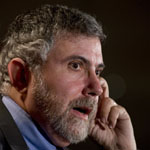
The Bush administration will invest about $125 billion in nine of the biggest U.S. banks, including Citigroup Inc. and Goldman Sachs Group Inc., in the government's latest attempt to shore up confidence in the financial system. The proposed cash injections in exchange for preferred shares are part of a $700 billion rescue approved by Congress and follows similar moves by European leaders to unfreeze global credit markets by helping beleaguered banks. The other companies are Wells Fargo & Co., JPMorgan Chase & Co., Bank of America Corp., Merrill Lynch & Co., Morgan Stanley, State Street Corp. and Bank of New York Mellon Corp., said people briefed on the plan. – Bloomberg
Dominant Social Theme: An evolution of "business as usual."
Free-Market Analysis: One would not have predicted years ago that the current American administration would be taking $125 billion-plus position in America's largest investment banks (eventually, we will see how much it really is), and dictating the terms as well. That this is taking place without much dissension and follows the lead of the European Union is stranger still. Finally, while the bail out was always amorphous due to the insistence of Treasury on maximum latitude, the final plan that is emerging, focuses apparently on stakes in healthy as well as shaky banks and banks rather than more mainstream corporate entities.
Here's more from the same article. The injections represent a new approach for Treasury Secretary Henry Paulson's attempts to prevent a financial market meltdown from sending the U.S. economy into a prolonged recession. He's following similar interventions by European leaders and using broad powers Congress gave him earlier this month to save the country's banking system. "They've decided they need to do something drastic and this is drastic,'' said Gerard Cassidy, a bank analyst at RBC Capital Markets in Portland, Maine. None of the banks getting government money was given a choice about it, said one of the people familiar with the plans. All of the banks involved will have to submit to compensation restrictions, said the person.
Providing the money this way, via purchases of shares in major banks in America and Europe, is easily the bluntest approach and probably the most distortive. What it distorts is what is left of the free-market system at the top of the corporate food chain. These are some of the most powerful and massive entities in Europe and America. Governments direct involvement in these entities means that the central banking model of finance is well on its way to becoming both a horizontal and vertical monopoly. Governments of major Western powers will not only control money creation, but now through stakes in the largest commercial banks will have a great say over who gets the money that is being created.
Central banks created the toxic debt that is clogging the arteries of international finance through the generation of a credit bubble and subsequent money mania. But the solution could have involved government insurance of these securities – a less intrusive arrangement that would likely have protected both banks and consumers. Instead, government officials the world over are apparently choosing to make direct purchases of private-sector banks.
These stakes will be held for a long time, obviously, to ensure taxpayers get their money back. That's what is stated anyway. But the idea that governments want to exercise control to ensure that taxpayers are made whole is a fairly astounding one. Government has never much cared for taxpayers in a central banking economy except as marginal sources of income. This sort of approach offers a slippery slope indeed.

The increased monopoly on money and credit that will result from the extraordinary bailout now taking place is difficult to construe as a positive, other than that is slows the unraveling of a fiat money system that is itself destructive. It is rife with conflicts of interest. Central banking has worked in part to serve the interests of the monetary elite because it was not exceptionally noticeable to those not involved in the process. But by taking positions in banks, government will inevitably be more intrusive in the lending process. And when it comes to large entities and large loans, the positioning becomes problematic indeed. The emergence of so many Goldman Sachs bankers in the US Treasury dept. has already sparked criticism and distrust. But once Western governments have stakes in the very largest corporate banking entities, such distrust will be powerfully multiplied. This bailout and the way that it has been constructed and then apparently initiated brings a host of problems that will be apparent long after the initial difficulties themselves – such as they are – have been dealt with.
